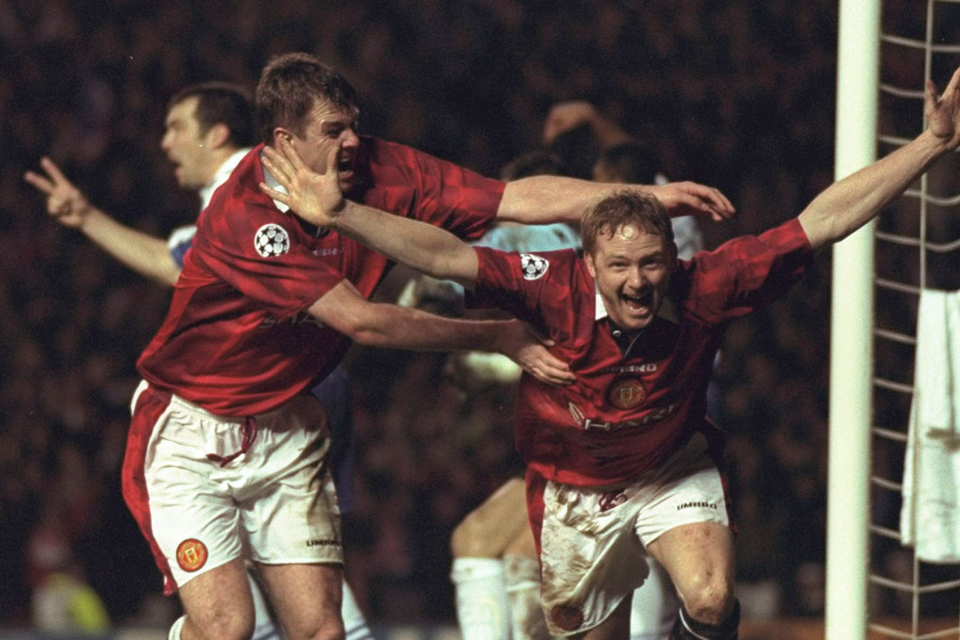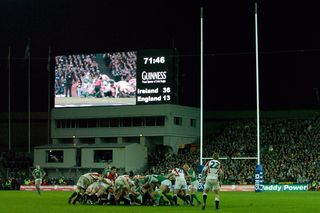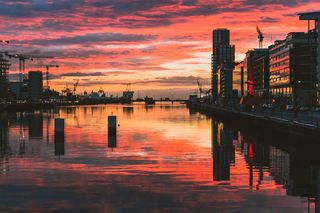Corrosive effect of big money on Champions League is clear to see
The competition only gets interesting in the latter stages, so why not admit it's not working?
David May (right) and Gary Pallister celebrate after May scored the opening goal in the Champions League Quarter Final First Leg against Porto, March 1997. United won 4-0. Photo: Getty/Shaun Botterill/Allsport
Everyone from Wayne Rooney to Iker Casillas has admitted it. When you hear the distinctive piece of Handel music that has become the Champions League theme, it "gives goosebumps", as the Spanish goalkeeper said - or "a tingle down your spine", as the Manchester United captain enthused. It does still have the power to conjure a sense of magic . . . until the music stops, the group games actually start, and that magic evaporates.
It very often seems like the tedium of the Champions League's opening stage is not worthy of a musical theme that evokes an epic mystique and football played at its most intense level.
Take this week, and the final set of group games. This should be a point in the competition when it is deeply tense, as the Champions League's own past has conditioned us to expect, but there is actually very little at stake. Of the 16 second-round places, only four are up for grabs and, of the week's 16 matches, only five have qualification on the line. They are: Benfica-Napoli and Dynamo Kyiv in Group B; Porto v already-qualified Leicester City and Brugge-Copenhagen in Group G; and Lyon-Sevilla.
That is the second lowest number of meaningful final group matches in 20 years, with only 2008-09 having less, with three. That lack of competitiveness and consequence is all the worse, however, because it feels like it's part of a concerning wider trend. Most depressingly, there's the issue that, of the 16 clubs currently occupying the top-two qualifying spots across the eight groups, 15 of them are among the two wealthiest sides in those groups. The exception is Tottenham Hotspur, who are richer than Monaco and Bayer Leverkusen, and are thereby the sole surprise exit so far. It says a lot, however, that a Premier League club going out to German and French sides is some kind of upset. That's how difficult it is to eliminate any of the big clubs, and precisely why it feels the Champions League doesn't really get started until the quarter-finals.
To fully grasp how corrosive money has been on the event's overall competitiveness, look back to 20 years ago, a 1996-97 season that also happened to be the last time the last day had exactly four places up for grabs, with seven teams going for them in five key matches. One of a few big differences, though, was that 1996-97 was a 16-team competition with just four groups, so over half the matches were consequential. Then there are the teams involved in that final shake-up: Ajax, Grasshoppers, Auxerre, Rosenborg, Milan, Manchester United, Fenerbahce.
Going by the last few years, most of those aren't exciting names, but that wasn't the case at the time. They were good sides with quality players, capable of undoing the best. United just about eliminated a Jay-Jay Okocha-fired Fenerbahce, while Rosenborg remarkably won at the San Siro, to beat and knock out a star-filled Milan that had reached the final a year before.
It is the case of Ajax, though, that says most about the Champions League's underwhelming drift towards a situation where it's overwhelmingly the same names, the same ties. Back in the mid-'90s, their supreme, largely homegrown squad featuring Patrick Kluivert and so many others were infamously picked off by wealthier clubs, but still stayed together long enough to actually win the competition in 1995. They put together another fine side by 2001, led by Wesley Sneijder, and they were allowed stay together for one proper tilt at the Champions League in 2002-03, when they reached the quarter-finals.
Now, though, any similar group barely gets a season together. The best players are often ghosted away before 20. It is the same for all the mid-tier countries' most respected academies, like Anderlecht, but also for any club outside the elite with ambition. There just isn't the scope now for there to be a Dynamo Kyiv 1999 or Deportivo La Coruna 2004. Those sides can't develop, because any promising player is pulled away by the super-clubs after a season. It is exactly why there is such a lack of variety in the competition, and why 62.5 per cent of semi-final places since 2010 have been taken by three clubs: Bayern Munich, Barcelona and Real.
None of this is a lament for the days when it was champions-only, since bringing the best together is in principle the best competition there can be, but the inherent problem is that the dynamics of it have fortified a process where more money goes to the same few clubs. For their part, Uefa have tried to tinker with the format to improve variety - like this season's seedings - but the competition is still too conditioned by existing money, and the big clubs can always resist change with the spectre of a breakaway.
In that sense, though, the Champions League group stages have suffered from the same force that has so skewed so many domestic leagues: pure capitalism. Look across Europe, at the amount of major leagues that have a few big expensive satellite clubs and then blips way beneath them. Spain has two giants and then one club who regularly require miracle work from Diego Simeone - Atletico Madrid; Germany has Bayern Munich and then Borussia Dortmund always fighting the tide. France and Italy, then, just have Paris Saint-Germain and Juventus.
These are the clubs that will be in the mix late in the competition, along with the wealth of the Premier League, and this is the problem that has ensured this week is so uninspiring. We may have to face the music and admit half the competition isn't worth watching.















